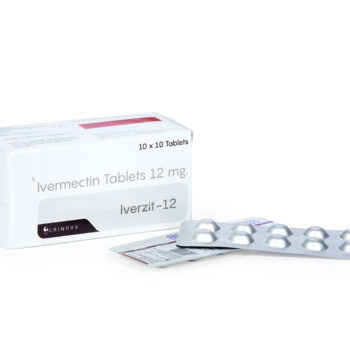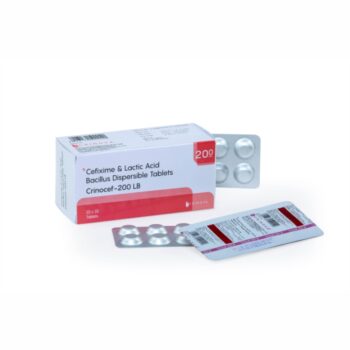INTRODUCTION
Amocrin-CV 625 is a combination of Amoxicillin and Clavulanic acid which belongs to the group of medicine called Antibiotics. It is indicated for the treatment of various infections like respiratory tract infections (Ex. adequately diagnosed community acquired pneumonia, chronic bronchitis), middle ear and sinus infections (Ex. acute otitis media, acute bacterial sinusitis), urinary tract infections (Ex. pyelonephritis or cystitis), skin and soft tissue infections (Ex. cellulitis, animal bites, dental infection) or bone and joint infections (Ex. osteomyelitis) caused by suspected drug- resistant bacterial strains in both adults and in children (weighing not less than 45 kg). Bacterial infections can be defined as a proliferation of various harmful strains of bacteria in the body. They can affect any part(s) of the body including the respiratory tract, urinary tract, eyes, ears, skin, soft tissue, or bones.
Amoxicillin is a penicillin-like antibiotic that acts by inhibiting the biosynthesis of a protective layer called peptidoglycan in the bacterial cell wall and clavulanic acid is a beta-lactamase inhibitor that acts by the reducing resistance for amoxicillin by inhibiting the activity of an enzyme called beta-lactamase in the bacterial cell. Collectively they interrupt the construction of the bacterial cell wall and ultimately lead to the destruction, or lysis, of the bacteria.
Try to take this medicine with or just after a meal or a snack to avoid feeling sick (nausea). Your doctor will decide the correct dose for you depending upon your age, body weight, health condition and type of infection. During the therapy your doctor might recommend you have several tests to monitor your kidney and liver function to rule the risk of unwanted side effects. Before taking this medicine, inform your doctor if you have any liver or kidney problems. Amocrin-CV 625 should be used with caution in pregnant or breastfeeding women. Consult your doctor before taking. The most common side effects of taking this medicine are diarrhea, nausea, vomiting, and stomach upset. Consult your doctor if any of the symptoms worsen.
USES OF Amocrin-CV 625
It is used to treat the following bacterial infections in both adults and in children (weighing not less than 40kg):
- Middle ear and sinus infections (Ex. acute otitis media, acute bacterial sinusitis)
- Respiratory tract infections (Ex. adequately diagnosed community acquired pneumonia, chronic bronchitis)
- Urinary tract infections (Ex. pyelonephritis or cystitis)
- Skin and soft tissue infections (Ex. cellulitis, animal bites, dental infection)
- Bone and joint infections (Ex. osteomyelitis)
HOW Amocrin-CV 625 WORKS
Amocrin-CV 625 kills the growth of harmful bacteria, where amoxicillin acts by inhibiting the biosynthesis of the peptidoglycan layer (a layer which is responsible for the survival of the bacteria) of the bacterial cell wall and clavulanic acid acts by restoring the antimicrobial effects of amoxicillin by deactivating an enzyme called beta-lactamase (which is responsible for causing resistance to various standard beta-lactam antimicrobials) in the bacterial cell. Collectively they interrupt the construction of the cell wall and ultimately lead to the destruction, or lysis, of the bacteria.
DIRECTIONS FOR USE
Take this medicine with meals or as advised by your physician. Swallow the medicine as a whole and do not crush or chew the medicine. Your doctor will decide the correct dose for you depending upon your age, body weight and type of infection. Continue to take this medicine, if your doctor tells you to do so, to obtain better results.
SIDE EFFECTS OF Amocrin-CV 625
COMMON
- Diarrhea, nausea, vomiting
- Thrush (a fungal infection of the skin, mouth, or vagina)
UNCOMMON
- Skin rash, itching with raised itchy bumps
- Indigestion
- Headache, dizziness
RARE
Stop taking this medicine and contact your doctor immediately if you experience any of the following side effects:
- Severe allergic reactions (such as skin rash, swelling of the eyelids, mouth, tongue and/or throat causing difficulty in breathing or swallowing, inflammation of blood vessels leading to the appearance of red or purple raised spots on the skin along with fever, joint pain, swollen glands in the neck, armpit, or groin, and/or collapse)
- Signs of inflammation of large intestine (such as watery diarrhea usually with blood and mucus along with stomach pain and/or fever)
- Signs of erythema multiforme (such as skin rash with blisters, flat, round, red targets that appears as dark circles with purple, grey centers, fatigue, cold sores along with joint pain and fever)
- Aseptic meningitis (inflammation of the protective membrane surrounding the brain)
- Serious skin reactions such as Stevens-Johnson syndrome or toxic epidermal necrolysis (severe widespread skin rash with blistering and peeling of skin, blisters and sores around the mouth, nose, eyes and genitals, weakness, body pain and fever), bullous exfoliative dermatitis (extreme skin redness, widespread skin rash with pus-filled blisters, scaling, crusting lesion, itching, swollen lymph nodes, tiredness, and fever), exanthemous pustulosis (red, scaly rash with bumps under the skin and blisters with fever) or Drug Reaction with Eosinophilia and Systemic Symptoms (DRESS; skin rash with itching, swollen glands, fever or flu-like symptoms, and increased white blood cells and liver enzymes)
HOW TO MANAGE SIDE EFFECTS
Nausea and vomiting:
Try to take this medicine with or just after a meal or a snack. Stick to simple meals. Avoid eating rich or spicy food.
Diarrhea:
Drink lots of fluids, such as water or fruit juices to keep yourself hydrated. Avoid taking any medicine on your own for treating diarrhea. Consult your doctor if the symptom did not improve.
Headache:
Rest and relax. Drink lot of fluids such as water or electrolytes. Apply a pain-relieving balm on the head if required. Do not consume too much of alcohol. Consult your doctor if the symptom did not improve.
Dizziness:
Try to rest and relax. Get enough sleep. Avoid driving or operating any tools or machines while you are feeling dizzy. Do not consume too much of alcohol, as it can aggravate your dizziness. Consult your doctor if the symptom did not improve.
Stomach pain:
Rest and relax. Eat and drink slowly or try to have smaller and frequent meals. Keep a heat pad on your stomach. Do not self-treat on your own and consult your doctor if the symptom did not improve on its own.
Skin rash:
Avoid hot showers because hot water can irritate your skin further. Do not scratch the affected area. Use protective clothing when going outdoors. Regularly moisturize your skin. Consult your doctor if the symptom did not improve.
WARNING & PRECAUTIONS
PREGNANCY
Amocrin-CV 625 should be used in pregnant women only if it is clearly necessary. Consult your doctor before taking.
BREASTFEEDING
Amocrin-CV 625 should be used in breastfeeding women only if it is clearly necessary. Consult your doctor before taking.
DRIVING AND USING MACHINES
Do not drive or operate any heavy tools or machines if you experience dizziness or convulsions after taking this medicine.
KIDNEY
Amocrin-CV 625 is not recommended for use in patients with severe kidney disease (such as kidney failure or hemodialysis). Consult your doctor before taking.
LIVER
Amocrin-CV 625 is not recommended for use in patients with liver disease (such as jaundice (yellowing of the skin and whites of the eye)). Kindly consult your doctor before taking.
ALLERGY
Talk to your doctor if you are allergic to Clavulanic acid, Amoxicillin, other penicillins (such as ampicillin) or to any other antibiotics.
OTHERS
Before taking this medicine, inform your physician if you:
- Have glandular fever (a type of viral infection that is spread by spitting, kissing or by sharing cups)
- Are not passing water regularly
- Are going to have blood test for RBC count or liver function
- Are going to have urine test for glucose
Use in pediatrics:
- Amocrin-CV 625 is considered safe for use in children weighing not less than 40 kg (preferably above 12 years). However, consult your doctor before taking.
Use in geriatrics:
- Amocrin-CV 625 is considered safe for use in elderly patients (aged 65 years or above). However, consult your doctor before taking.
INTERACTIONS
- Drug-Drug interactions:
Inform your physician, if you are taking,
- Allopurinol or probenecid (used to treat gout)
- Medicines used to stop blood clots (such as warfarin)
- Methotrexate (a medicine used to treat rheumatic diseases or cancer)
- Mycophenolate mofetil (a medicine used to prevent graft rejection)
Overdosage:
If you or anyone else accidentally take too much of this medicine, contact your doctor immediately or go to a hospital straight away. Symptoms of overdosage might include upset stomach, nausea, vomiting, diarrhea, or convulsions.
SYNOPSIS
| Drug | : | Amoxicillin, Clavulanic acid |
| Pharmacological Category | : | Antibiotics |
| Therapeutic Indication | : | Bacterial infections |
| Dosage Forms | : | Tablet, Dispersible tablet, Syrup, Suspension, Oral drops,Dry syrup, Powder, Injection |
MORE INFORMATION
- Keep out of reach of children
- Store at room temperature
FAQs ABOUT Amocrin-CV 625
Can Amocrin-CV 625 treat cold?
No. This medicine is used to treat bacterial infections of respiratory tract such as sore throat. It has no impact on the harmful virus causing cold and cough.
Can Amocrin-CV 625 be taken together with azithromycin?
Yes. There were no interactions found between this medicine with other antibiotics such as azithromycin. However, consult your doctor before taking this medicine.
Can Amocrin-CV 625 treat typhoid?
Although ciprofloxacin and intravenous ampicillin were the first-line medicines prescribed to treat typhoid fever, this medicine was also found to be effective against typhoid causing bacteria. However, consult your doctor before taking.
Can Amocrin-CV 625 treat hemorrhoids?
This medicine can treat hemorrhoids caused by susceptible bacteria. However, consult your doctor before taking this medicine if you have hemorrhoids. Your doctor will decide the suitable medicine, dose, and duration of therapy for you depending upon your age, body weight and type of infection.
Can Amocrin-CV 625 be mixed with milk?
This medicine can be mixed with milk, baby formula, fruit juice or other cold beverages to encourage consumption by the children. Although, milk has some influence on the bioavailability of this medicine there were no notable interactions between this medicine and milk and therefore it can be considered safe when mixed with milk before consumption. Consult your doctor before taking as a precaution.



